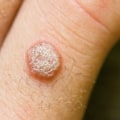Genital warts are a common sexually transmitted infection (STI) caused by the human papillomavirus (HPV). They are usually identified as small bumps or clusters of bumps in the genital area. These warts can be small or large, raised or flat, or shaped like a cauliflower. They may resemble little pieces of cauliflower and can be single or multiple, big or small.
They may itch, but most of the time they don't hurt. Genital warts affect the moist tissues in the genital area. You can get warts even if you use condoms or don't have penetrative sex, since a condom doesn't cover all of your genital skin. Using a condom every time you have vaginal, anal, or oral sex is the best way to avoid spreading genital warts to your partner.
Symptoms of genital warts caused by HPV in men include small bumps or groups of bumps on the tip or shaft of the penis, scrotum, or anus. Rather than looking for the early signs of genital warts and having to treat them after they have appeared, it is best to try to prevent infection. The HPV vaccine offered to girls and boys in the United Kingdom to protect against cervical cancer also protects against genital warts. If you think you may have genital warts, you should schedule an appointment with your GP or contact local sexual health services. It can take several weeks, months, or even years after having sexual contact with someone who has genital warts for them to appear. However, on rare occasions, genital warts can multiply in large groups in people with a weakened immune system.
Women who have recently had unprotected sex and are looking for early signs of genital warts should be checked regularly. Not all blemishes are warts; there are all types of warts, bumps, or pimples that can appear on the genitals. Not all genital bumps are warts, so it's helpful to get evaluated and get a treatment recommendation if you think you might have them. Be sure to get screened for cancer of the cervix, vagina, vulva, or anus if you have been diagnosed with genital warts. Genital warts are a common STI that can cause discomfort and embarrassment. It is important to be aware of the signs and symptoms of this condition so that you can seek medical attention if necessary.
Knowing how to prevent infection is also key in avoiding this condition.










